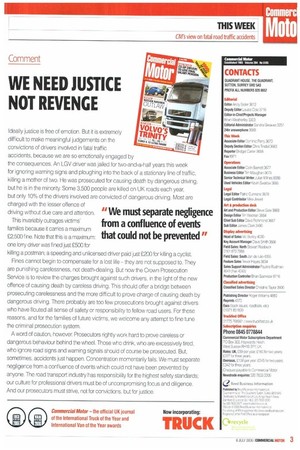WE NEED JUSTICE NOT REVENGE
Page 3

If you've noticed an error in this article please click here to report it so we can fix it.
"We must separate negligence from a confluence of events that could not be prevented
Ideally justice is free of emotion. But it is extremely difficult to make meaningful judgements on the convictions of drivers involved in fatal traffic accidents, because we are so emotionally engaged by the consequences. An LGV driver was jailed for two-and-a-half years this week for ignoring warning signs and ploughing into the back of a stationary line of traffic, killing a mother of two. He was prosecuted for causing death by dangerous driving, but he is in the minority. Some 3,500 people are killed on UK roads each year, but only 10% of the drivers involved are convicted of dangerous driving. Most are charged with the lesser offence of driving without due care and attention.
This invariably outrages victims' families because it carries a maximum £2,500 fine. Note that this is a maximum: one lorry driver was fined just £500 for killing a postman; a speeding and unlicensed driver paid just £200 for killing a cyclist.
Fines cannot begin to compensate for a lost life they are not supposed to. They are punishing carelessness, not death-dealing. But now the Crown Prosecution Service is to review the charges brought against such drivers, in the light of the new offence of causing death by careless driving. This should offer a bridge between prosecuting carelessness and the more difficult to prove charge of causing death by dangerous driving. There probably are too few prosecutions brought against drivers who have flouted all sense of safety or responsibility to fellow road users. For these reasons, and for the families of future victims, we welcome any attempt to fine tune the criminal prosecution system.
A word of caution, however. Prosecutors rightly work hard to prove careless or dangerous behaviour behind the wheel. Those who drink, who are excessively tired, who ignore road signs and warning signals should of course be prosecuted. But, sometimes, accidents just happen. Concentration momentarily fails. We must separate negligence from a confluence of events which could not have been prevented by anyone. The road transport industry has responsibility for the highest safety standards: our culture for professional drivers must be of uncompromising focus and diligence. And our prosecutors must strive, not for convictions, but for justice.




































































































































































































